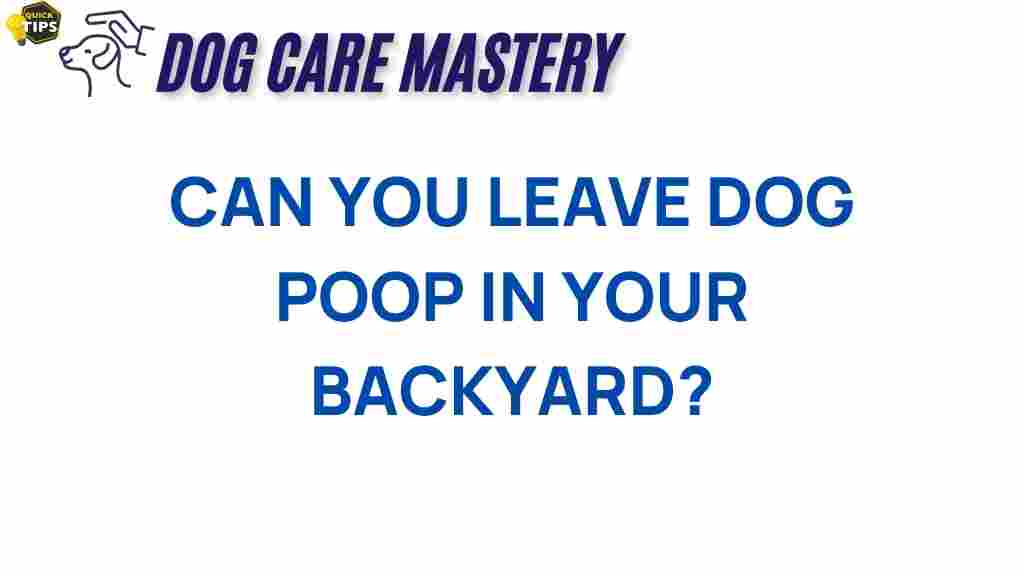The Untold Truth: Is Leaving Dog Waste in Your Backyard a Good Idea?
As dog owners, we often face the dilemma of what to do with our pets’ waste. The question arises: is leaving dog waste in your backyard a good idea? While some might argue that it’s a natural fertilizer, the reality is far more complex. In this article, we’ll explore the untold truth about dog waste, its implications for your yard, your dog’s health, and the environment. Let’s dive in!
Understanding Dog Waste
Dog waste, often referred to as dog poop, is a byproduct of your dog’s digestion. While it may seem innocuous, it can pose several challenges if not disposed of properly. Here are some key points to consider:
- Health Risks: Dog waste can harbor various pathogens that can affect both humans and animals. This includes bacteria like E. coli and parasites such as roundworms.
- Environmental Impact: Leaving dog waste in your backyard can lead to water pollution. When it rains, the waste can wash into storm drains, eventually making its way into rivers and lakes.
- Odor and Attractiveness: An accumulation of dog waste can create an unpleasant odor and detract from the beauty of your yard.
Why Leaving Dog Waste in Your Backyard is Not a Good Idea
Now that we understand what dog waste is, let’s delve into the reasons why leaving it in your yard is not the best choice:
1. Health Hazards
One of the significant concerns about dog waste is the potential health hazards it poses. Dog poop can contain:
- Bacteria: Pathogens such as Salmonella and Campylobacter can lead to gastrointestinal diseases.
- Parasites: Worms and protozoa can be harmful to both dogs and humans, especially children.
By allowing dog waste to accumulate, you increase the risk of these health issues for your family and pets.
2. Environmental Concerns
Leaving dog waste in your backyard can contribute to environmental degradation:
- Water Pollution: Rain can wash dog waste into the stormwater system, leading to contamination of local waterways.
- Soil Quality: While some may claim that dog waste acts as fertilizer, the reality is that it can disrupt soil pH and lead to an unhealthy environment for plants.
3. Aesthetic Issues
From an aesthetic perspective, a yard littered with dog poop is far from appealing. It can discourage you and your guests from enjoying outdoor activities, and it can also lower your property value.
Step-By-Step: Proper Dog Waste Disposal
Now that we’ve established the reasons against leaving dog waste in your backyard, let’s explore the best practices for disposal:
Step 1: Always Carry Waste Bags
When you take your dog for a walk, ensure you have waste bags with you. This makes it easy to clean up after your pet, no matter where you are.
Step 2: Choose the Right Disposal Method
There are several ways to dispose of dog waste effectively:
- Trash Bin: Seal the waste in a bag and throw it in your household trash.
- Composting: If you’re an environmentally-conscious pet owner, consider using a pet waste composting system designed for dog waste.
- Dog Waste Disposal Systems: There are specific systems designed to break down dog waste, similar to a septic system for humans.
Step 3: Maintain a Clean Yard
Regularly check your yard for any waste left behind. A good rule of thumb is to clean up after your dog every time they go outside.
Troubleshooting Common Issues
Sometimes, even with the best intentions, dog waste management can pose challenges. Here are some common issues and how to troubleshoot them:
Problem: Forgetting to Clean Up
Solution: Set reminders on your phone or create a cleaning schedule to ensure you don’t forget to clean up after your dog.
Problem: Persistent Odor
Solution: If your yard has a lingering smell, consider using pet-safe enzymatic cleaners to neutralize odors effectively.
Problem: Attracting Pests
Solution: Keeping your yard clean will also help prevent pests such as flies and rodents from being attracted to the area.
Conclusion: The Responsible Choice
In conclusion, leaving dog waste in your backyard is not a good idea. The health risks, environmental concerns, and aesthetic issues far outweigh any perceived benefits. As responsible pet owners, it is our duty to manage our dogs’ waste properly to ensure a healthy environment for ourselves, our pets, and the community.
By following proper disposal methods, maintaining a clean yard, and troubleshooting common issues, you can foster a safer and more enjoyable outdoor environment. Remember, every little bit helps in keeping our neighborhoods clean and healthy.
For more tips on responsible pet ownership, check out our detailed guide.
To learn more about the environmental impacts of pet waste, visit this informative resource.
This article is in the category Behavior and created by dogcaremastery Team
